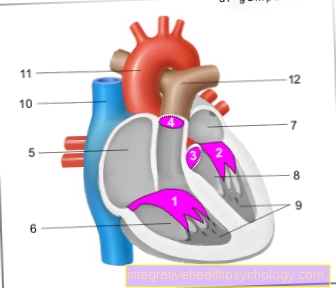The creatine kinase
introduction
The creatine kinase is an enzyme that uses a biochemical reaction to ensure that sufficient energy is available to the cells.
It is found in muscle cells and in the brain and is always released by the body when there is damage to the muscle tissue due to illness or stress. This can be the case with exercise or childbirth if there is no disease value.
However, the creatine kinase level is also an important indicator of life-threatening diseases such as heart attack.

What is Creatine Kinase?
The creatine kinase or creaktin kinase (CK) is an important enzyme in the human body that is required for energy metabolism. Creatine kinase is mainly found inside muscle cells - but the enzyme can also be found in the brain and other organs, such as the heart.
Depending on the organ, the creatine kinase has a different chemical structure, so that there are four sub-forms a distinction can be made:
- CK-MM occurs in the muscle cells of the musculoskeletal system
- CK-MB in the heart muscle cells
- CK-BB in the nerve cells of the brain and
- CK-Mini in the sheaths of the mitochondria.
More information on this topic: Diagnosis of a heart attack
What is the function of creatine kinase?
The creatine kinase belongs to the group of kinases. This group of enzymes has the task of providing the cells with sufficient energy for movement and metabolism. Because for every muscle contraction the cell needs energy in the form of Adenosine triphosphate (ATP). This molecule consists of carbon, hydrogen, oxygen and three phosphate atoms.
In order for energy to be released, the connection must be broken and a phosphate atom split off. What remains is a low-energy one Adenosine diphosphate (= Connection with two phosphates). Since the storage of ATP in the cells is very low at 5 micromoles per gram of muscle, ATP is quickly used up. In order for energy to continue to be available, the ATP must be restored. This can be done as quickly as possible with the help of creatine kinase.
As soon as there is a lack of energy due to illness or stress and the associated destruction of muscle cell tissue, creatine kinase is released. It passes into the blood and attaches a new phosphorus group to the adenosine phosphate without consuming oxygen, so that it is converted back into the activated state of ATP.
You may also be interested in this topic:
- The role of enzymes in the human body
- The effects of creatine
Creatine kinase values
The creatine kinase values tell you how high the concentration of the enzyme is in the blood serum. However, it is not the absolute concentration that is measured, but the activity of the enzyme. This is calculated from the amount of substrate converted per minute. The result is given in units (U) per liter of substrate (L). The reference values can vary from laboratory to laboratory as there are different methods of measurement.
The following reference values are often used for measurements at 37 °: For men, the creatine kinase value is in the normal range if it is below 190 U / L; for women, the creatine kinase value should be below 170 U / L. Since there are sometimes strong daily and seasonal fluctuations and various factors (such as sport, medication) can influence the creatine kinase values, the values must always be interpreted by a doctor.
In addition, the creatine kinase values must be analyzed in connection with other blood values and over time. This means that elevated creatine kinase levels do not necessarily have to be associated with illness.
Typical examples of increased creatine kinase values with no disease value are, for example, sore muscles, condition after operations or after childbirth. However, the creatine kinase values are often used to make a diagnosis.
First the general creatine kinase value is considered. If this is too high, the various sub-forms are determined and analyzed. Depending on which of these values is too high, a conclusion can then be drawn about the respective damage location.
- For example, is this the CK-MB value, this indicates a heart condition such as heart attack, myocarditis, or coronary artery disease.
- Other diseases for which the determination of CK values is essential are Parkinson's, epilepsy, hereditary muscle diseases or congenital amyotrophic lateral sclerosis.
- But the creatine kinase value is also higher in the event of acute injuries, electrical accidents or injections in the muscles.
On the other hand, creatine levels that are too low have no disease value.
You might also be interested in:
- Creatine
- Function of creatine
Creatine Kinase in Sports
The enzyme creatine kinase is released from the body whenever the muscle tissue is damaged. This is the case in the event of a lack of oxygen, overload or injury. Consequently, the creatine kinase level can also increase through exercise. This process is purely physiological and has no disease value - even if the values even increase to two thousand times the normal values. This seldom happens with regular and constant mechanical stress, but rather with unusual and strong changes in the extent and intensity of the stress.
This occurs especially in athletes who start training again after a long break from training. The body is then not able to cope with the new stress and releases creatine kinase as a result. Especially with eccentric muscle contractions, strength and speed strength training, the creatine kinase values increase significantly. The same happens with unusually long loads, such as marathons or triathlons. Therefore, competitive athletes generally have an increased creatine kinase concentration in their blood. Normally, the values should normalize again after two weeks of physical rest at the latest. This long period of time is explained by the fact that creatine kinase leaves a lot of waste products. These all have to be broken down by the kidney. If the creatine kinase levels in the blood are too high on a regular basis, this can, in extreme cases, damage the kidneys.
More information on this topic:
- Taking creatine
- Creatine capsule
- Creatine powder
Summary
Creatine kinase is an enzyme that occurs mainly in muscles, but also in organs. Depending on the place of function, a distinction is made between four sub-forms, which differ in their chemical structure. It is not only elementary for the supply of energy in the cells, but is an important marker in diagnostics. The creatine kinase value can be a clear indicator of a heart attack, Parkinson's disease or hereditary muscle diseases.
Recommendations from our editorial team
- Diagnosis of a heart attack
- Creatine monohydrate
- Side effects of creatine
- How useful is creatine?
- Food supplements





.jpg)























